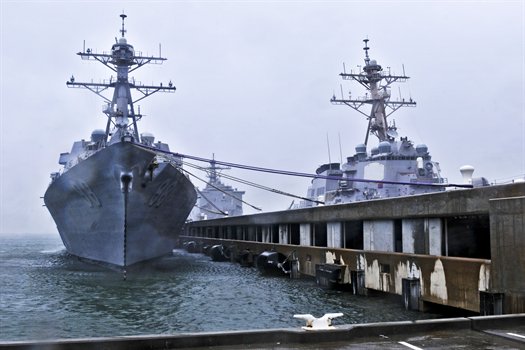 Three U.S. ships in port as Hurricane Irene passes.
Three U.S. ships in port as Hurricane Irene passes.
Fallon on Climate Security
In the Senate Armed Services Committee hearing on Global Challenges and U.S. National Security Strategy, ASP board member Admiral William “Fox” Fallon, United States Navy (Ret.) emphasized how climate change poses threats to our national security. When asked by Senator Blumenthal of Connecticut, “to what extent is climate disruption a national security threat?” Admiral Fallon delivered a lengthy response emphasizing the near and short term threats of climate change, as well as the importance of the U.S. taking the lead on it as an issue.
Admiral Fallon first mentioned the increasingly important role of the shifting dynamic of the Arctic region as a security issue, a topic which ASP continues to explore. Fallon pointed out the increasing potential for rivals to exploit the newly accessible region, stating,
“…the advance of Russia and Putin’s opportunism and what the Russians want, and what Putin has in mind for us, he is going to have some significant options pretty soon as the Arctic continues to lose its ice pack and become basically accessible twelve months of the year. This gives them significant opportunities to move things around and act in ways in which they were significantly inhibited in the past. It may also give him some other opportunities economically.”
Fallon was also keen to point out that security concerns for the U.S. and climate change are not limited to direct effects from climate change, but that the challenges from climate change affect the security environment at a very basic level.
“The problems we deal with, almost every single one of them, has its roots and instability in security at a very basic level. Not armies, not ISIS running around in pick-up trucks with .50 caliber guns, it’s what people feel very close to them. So if they feel threatened in their livelihoods, in their families, or their abilities, then things start to get unraveled, and that’s the potential that I think we face.”
In his statement, Fallon also took the opportunity to emphasize the need for U.S. leadership in dealing with climate change, a position which ASP has discussed as well.
“As the world grapples with these issues, that apply to all of us, I think that U.S. leadership ought to be paramount, ought to be at the forefront, and sometimes we’re not there. We’re not there. We’re not voting, we’re denying or avoiding, we’re just defaulting to somebody else. And despite the sometimes incessant gnawing of people, ‘oh the U.S. is always trying to get into this and push that,’ the world really needs our leadership and involvement. And this is an area where we could probably do some good if we put our minds to this.”
A changing climate is a threat to security. As climate continues to be a key variable that defines the security environment the U.S. must operate in, the U.S. military will need to expand its capabilities to deal with these new challenges. It will affect global stability, homeland security, and the viability of the military’s bases.
For a complete video of the hearing, please see the embedded video below. Admiral Fallon’s response on climate change begins at 3:06:00. For a transcript of Admiral Fallon’s response, click here.
For more information on climate security, please read ASP’s Climate Security Report. To learn more about a specific issue, please explore ASP’s previous publications listed below.
National Survey On Global Warming
FACT SHEET: Arctic Climate and Energy
Offshore Oil Drilling in the Arctic
A New Discourse: Climate Change in the Face of a Shifting U.S. Energy Portfolio
America’s Energy Choices: 2012 Edition
Pay Now, Pay Later: A State-by-State Assessment of the Costs of Climate Change
Degrees of Risk: Defining a Risk Management Framework for Climate Security
Climate Change and Immigration: Warnings for America’s Southern Border







[…] Fallon on Climate Security […]